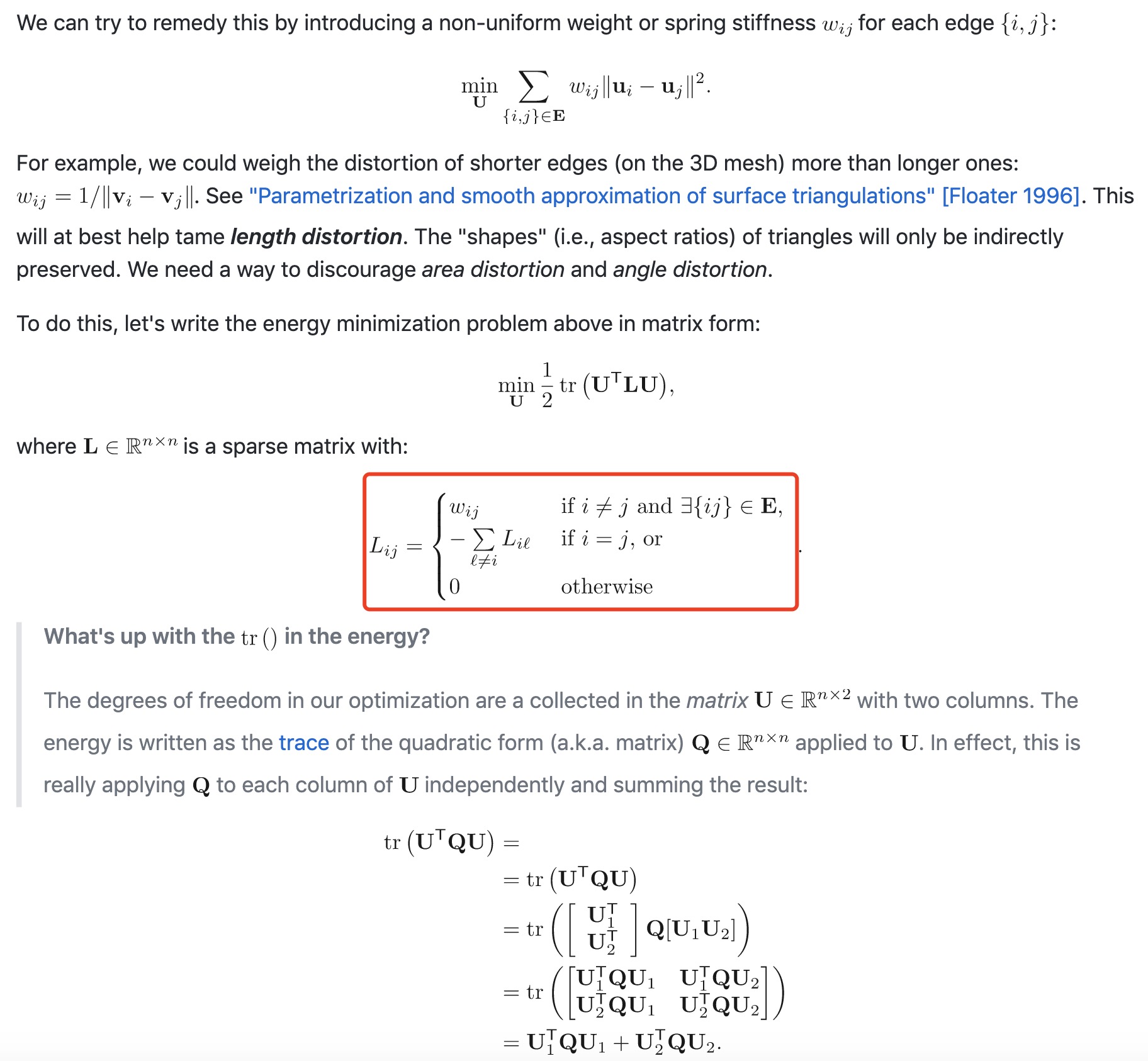An example from Geometry Processing: Parameterization
The original equation:

I❤️LA implementation:
L_i,j = { w_i,j if (i,j) ∈ E
0 otherwise
L_i,i = -∑_(ℓ for ℓ ≠ i) L_i,ℓ
where
L ∈ ℝ^(n×n)
w ∈ ℝ^(n×n): edge weight matrix
E ∈ {ℤ²} index: edgesI❤️LA compiled to C++/Eigen:
/*
L_i,j = { w_i,j if (i,j) ∈ E
0 otherwise
L_i,i = -∑_(ℓ for ℓ ≠ i) L_i,ℓ
where
L ∈ ℝ^(n×n)
w ∈ ℝ^(n×n): edge weight matrix
E ∈ {ℤ²} index: edges
*/
#include <Eigen/Core>
#include <Eigen/Dense>
#include <Eigen/Sparse>
#include <iostream>
#include <set>
struct course_parameterizationResultType {
Eigen::SparseMatrix<double> L;
course_parameterizationResultType(const Eigen::SparseMatrix<double> & L)
: L(L)
{}
};
/**
* course_parameterization
*
* @param w edge weight matrix
* @param E edges
* @return L
*/
course_parameterizationResultType course_parameterization(
const Eigen::MatrixXd & w,
const std::set<std::tuple< int, int > > & E)
{
const long n = w.cols();
assert( w.rows() == n );
Eigen::SparseMatrix<double> L(n, n);
std::vector<Eigen::Triplet<double> > tripletList_L;
for( int i=1; i<=n; i++){
for( int j=1; j<=n; j++){
if(E.find(std::tuple< int, int >(i-1, j-1)) != E.end()){
tripletList_L.push_back(Eigen::Triplet<double>(i-1, j-1, w(i-1, j-1)));
}
}
}
L.setFromTriplets(tripletList_L.begin(), tripletList_L.end());
for( int i=1; i<=n; i++){
double sum_0 = 0;
for(int ℓ=1; ℓ<=L.cols(); ℓ++){
if(ℓ != i){
sum_0 += L.coeff(i-1, ℓ-1);
}
}
tripletList_L.push_back(Eigen::Triplet<double>(i-1, i-1, -sum_0));
}
L.setFromTriplets(tripletList_L.begin(), tripletList_L.end());
return course_parameterizationResultType(L);
}
void generateRandomData(Eigen::MatrixXd & w,
std::set<std::tuple< int, int > > & E)
{
const int n = rand()%10;
w = Eigen::MatrixXd::Random(n, n);
const int dim_1 = rand()%10;
for(int i=0; i<dim_1; i++){
E.insert(std::make_tuple(rand()%10, rand()%10));
}
}
int main(int argc, char *argv[])
{
srand((int)time(NULL));
Eigen::MatrixXd w;
std::set<std::tuple< int, int > > E;
generateRandomData(w, E);
course_parameterizationResultType func_value = course_parameterization(w, E);
std::cout<<"return value:\n"<<func_value.L<<std::endl;
return 0;
}I❤️LA compiled to Python/NumPy/SciPy:
"""
L_i,j = { w_i,j if (i,j) ∈ E
0 otherwise
L_i,i = -∑_(ℓ for ℓ ≠ i) L_i,ℓ
where
L ∈ ℝ^(n×n)
w ∈ ℝ^(n×n): edge weight matrix
E ∈ {ℤ²} index: edges
"""
import numpy as np
import scipy
import scipy.linalg
from scipy import sparse
from scipy.integrate import quad
from scipy.optimize import minimize
class course_parameterizationResultType:
def __init__( self, L):
self.L = L
def course_parameterization(w, E):
"""
:param :w : edge weight matrix
:param :E : edges
"""
w = np.asarray(w, dtype=np.float64)
E = frozenset(E)
n = w.shape[1]
assert w.shape == (n, n)
Lij_0 = []
Lvals_0 = []
for i in range(1, n+1):
for j in range(1, n+1):
if (i-1, j-1) in E:
Lij_0.append((i-1, j-1))
Lvals_0.append(w[i-1, j-1])
sparse_0 = scipy.sparse.coo_matrix((Lvals_0, np.asarray(Lij_0).T), shape=(n, n))
L = sparse_0
for i in range(1, n+1):
sum_0 = 0
for ℓ in range(1, L.shape[1]+1):
if(ℓ != i):
sum_0 += L.tocsr()[i-1, ℓ-1]
Lij_0.append((i - 1, i - 1))
Lvals_0.append(-sum_0)
L = scipy.sparse.coo_matrix((Lvals_0, np.asarray(Lij_0).T), shape=(n, n))
return course_parameterizationResultType(L)
def generateRandomData():
n = np.random.randint(10)
w = np.random.randn(n, n)
E = []
dim_0 = np.random.randint(1, 10)
for i in range(dim_0):
E.append((np.random.randint(10), np.random.randint(10)))
return w, E
if __name__ == '__main__':
w, E = generateRandomData()
print("w:", w)
print("E:", E)
func_value = course_parameterization(w, E)
print("return value: ", func_value.L)I❤️LA compiled to MATLAB:
function output = course_parameterization(w, E)
% output = course_parameterization(w, E)
%
% L_i,j = { w_i,j if (i,j) ∈ E
% 0 otherwise
% L_i,i = -∑_(ℓ for ℓ ≠ i) L_i,ℓ
%
% where
% L ∈ ℝ^(n×n)
% w ∈ ℝ^(n×n): edge weight matrix
% E ∈ {ℤ²} index: edges
if nargin==0
warning('generating random input data');
[w, E] = generateRandomData();
end
function [w, E] = generateRandomData()
n = randi(10);
w = randn(n, n);
E = [];
dim_2 = randi(10);
for i = 1:dim_2
E = [E;randi(10), randi(10)];
end
end
n = size(w, 2);
assert( isequal(size(w), [n, n]) );
assert(size(E,2) == 2)
Lij_0 = zeros(2,0);
Lvals_0 = zeros(1,0);
for i = 1:n
for j = 1:n
if ismember([i, j],E,'rows')
Lij_0(1:2,end+1) = [i;j];
Lvals_0(end+1) = w(i, j);
end
end
end
sparse_0 = sparse(Lij_0(1,:),Lij_0(2,:),Lvals_0,n,n);
L = sparse_0;
for i = 1:n
sum_0 = 0;
for ell = 1:size(L,2)
if ell ~= i
sum_0 = sum_0 + L(i, ell);
end
end
Lij_0(1:2,end+1) = [i;i];
Lvals_0(end+1) = -sum_0;
end
L = sparse(Lij_0(1,:),Lij_0(2,:),Lvals_0,n,n);
output.L = L;
end
I❤️LA compiled to LaTeX:
\documentclass[12pt]{article}
\usepackage{mathdots}
\usepackage[bb=boondox]{mathalfa}
\usepackage{mathtools}
\usepackage{amssymb}
\usepackage{libertine}
\DeclareMathOperator*{\argmax}{arg\,max}
\DeclareMathOperator*{\argmin}{arg\,min}
\usepackage[paperheight=8in,paperwidth=4in,margin=.3in,heightrounded]{geometry}
\let\originalleft\left
\let\originalright\right
\renewcommand{\left}{\mathopen{}\mathclose\bgroup\originalleft}
\renewcommand{\right}{\aftergroup\egroup\originalright}
\begin{document}
\begin{center}
\resizebox{\textwidth}{!}
{
\begin{minipage}[c]{\textwidth}
\begin{align*}
\mathit{L}_{\mathit{i}, \mathit{j}} & = \begin{cases} \mathit{w}_{\mathit{i}, \mathit{j}} & \text{if } \left( \mathit{i}, \mathit{j} \right) \in \mathit{E} \\ 0 & \text{otherwise} \end{cases} \\
\mathit{L}_{\mathit{i}, \mathit{i}} & = -\sum_{\mathit{ℓ} ≠ \mathit{i}} \mathit{L}_{\mathit{i}, \mathit{ℓ}} \\
\intertext{where}
\mathit{L} & \in \mathbb{R}^{ \mathit{n} \times \mathit{n} } \\
\mathit{w} & \in \mathbb{R}^{ \mathit{n} \times \mathit{n} } \text{ edge weight matrix} \\
\mathit{E} & \in \{\mathbb{Z}^{ 2 }\} \mathit{{ index}} \text{ edges} \\
\\
\end{align*}
\end{minipage}
}
\end{center}
\end{document}
I❤️LA LaTeX output: